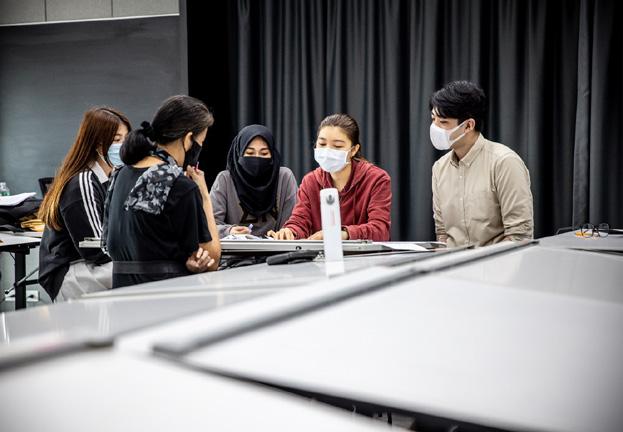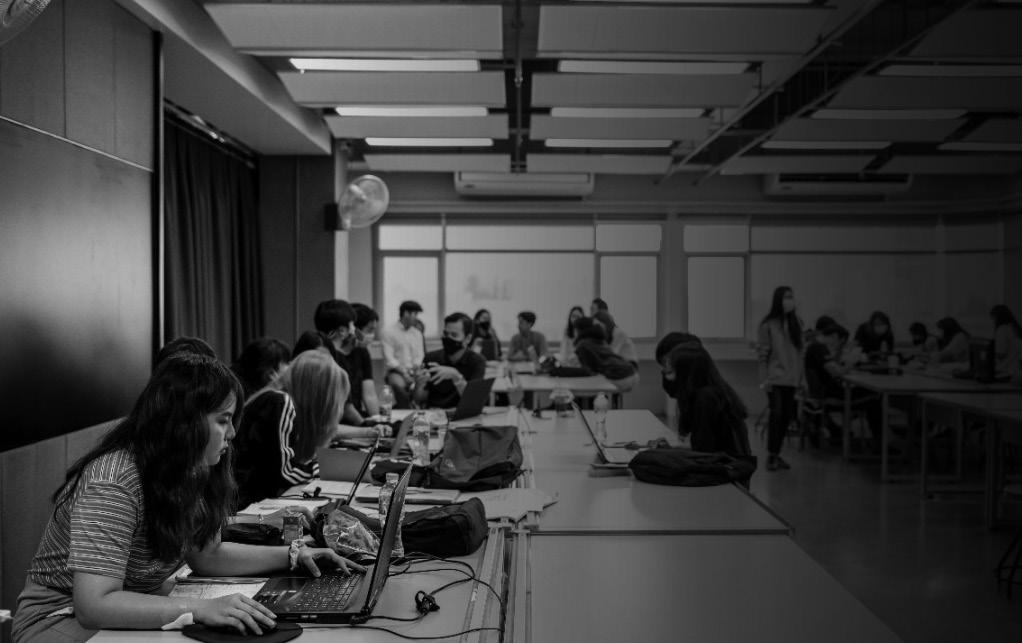
5 minute read
MESSAGE FROM THE DEAN
Re-inventing Future
Assistant Professor Asan Suwanarit
Dean of Faculty of Architecture and Planning, Thammasat University With the country’s declining birthrate and less employment opportunities, the next generation needs a different set of skills while those already in the professions need to adapt to a fast-changing world by re-skilling / up-skilling. A nontraditional education involves learner-centric teaching methods that impresses the value of life-long learning. At the Faculty of Architecture and Planning at Thammasat University, also known as Thammasat Design School (TDS), we teach students not “what” they need to know, but “how” to find out what they need to know. We therefore teach about thinking processes and research methodologies and how to collect and analyze data that will lead to informed decision-making. We believe that these are the kind of skills that will equip students with the ability to adapt to the ever-changing contexts and situations.
We focus on instilling design leadership, not in the sense of attaining positions of power, but by being thought leaders within society, through fostering in students the habit of constantly posing questions about the world around us, which is one of the hallmarks of a good leader.
On the part of the faculty, the post-pandemic world demands new questions and frameworks for research as well as professional leadership. Although the school is not focused on being a provider of professional services, academia nevertheless needs to play a greater role in guiding practice, with research geared towards professional practice or being more directly connected to contemporary issues faced by society, from the small scale of residential units to the urban scale of public green spaces.
Message from the Dean There is today a need to reimagine and shift the role of university education towards a non-traditional model where our students are allowed to “learn fast, fail fast” and to instill the mindset of livelong learning that can happen anywhere and at any time.
Inspiring Design-driven Future
The future needs to be planned, or designed by considering the 3i + 1S, which is Integration, International Mindset, Innovation and Sustainability.

Integration
For Thammasat Design School, integration means cross-disciplinary collaboration, such as by teaming up with doctors, HVAC engineers and social services workers to provide solutions for the problems of the city, while being aware of our strength and expertise in the understanding of the built environment, which needs to be enlarged to encompass the scale of cities and all their complexities, engaging with not only the physical dimension, but also health, natural environment and the economy.
International Mindset
If before, “international mindset” was about internationalization, now it must be viewed as a matter of multiculturalism. We have seen just how quickly something such as the COVID-19 pandemic could disrupt and cause a short-term collapse of the airline and tourism industries, calling for a global response and worldwide cooperation and highlighting the need for a more acute awareness of global issues. More than ever, we need a world without borders, where in the future if the WHO talks about design standards to solve a pandemic, we need designers, urban planners and strategists who can translate these requirements into design briefs.
Innovation
Innovation needs to be human-centered, responding to people’s needs and problems, and based on sound business models and know-how so that these ideas can be implemented sustainably. Moreover, decisions need to be data-driven, buildings and cities should be managed through the use of data. For example, the 7th floor addition to our faculty building will have an adaptive façade design with louvers that automatically adjust their angle according to the direction of sunlight. This is nothing new, but has rarely been a topic of research or implemented in practice in Thailand.


Sustainability
Aside from environmental sustainability, we need to start thinking more about economic and social sustainability as well. What might social sustainability mean? An example might be the passing on of cultural knowledge from one generation to the next. A project where these principles have been put to practice is the Thammasat-Nava Nakorn Smart City, where TDS integrated with corporate partners as well as teamed up internationally with Harvard University’s Graduate School of Design to investigate innovative solutions and technologies for a smart city with people’s needs as the starting point. Following from this, a future collaboration with Harvard University will involve an international research center for urban design and development.
The COVID-19 pandemic made it clear that for the past two decades, the school have been heading in the right direction. We were able to adapt quickly and our short courses satisfy the need to think of solutions quickly and to always be tackling new design briefs.

Certain design doctrines will need to be rethought or framed differently, such as preaching about density in cities in order to make effective use of infrastructure and limited spaces, an urban quality that suddenly became undesirable or even dangerous during a pandemic. However, certain things remain the same, such as our belief that a good education is not just about receiving knowledge, but also about the social and intellectual exchanges between students and teachers and between peers.
Our role as educators is always to think ahead, to “learn fast, fail fast”, and to look beyond traditional ideas about education. As an educational institution, our role is not just to produce skilled graduates for the labor market, but contributors to society and the economy. Our role is to produce leaders with the ability to guide society and in order to do that you need to have innovation to drive more efficient ways of working. The goal of education is still about sustainability and the university itself needs to be sustainable. We need to clearly demonstrate the value and benefits of higher education to students, and to create a more integrated relationship between industry and academia, working together towards a more sustainable future for all.





